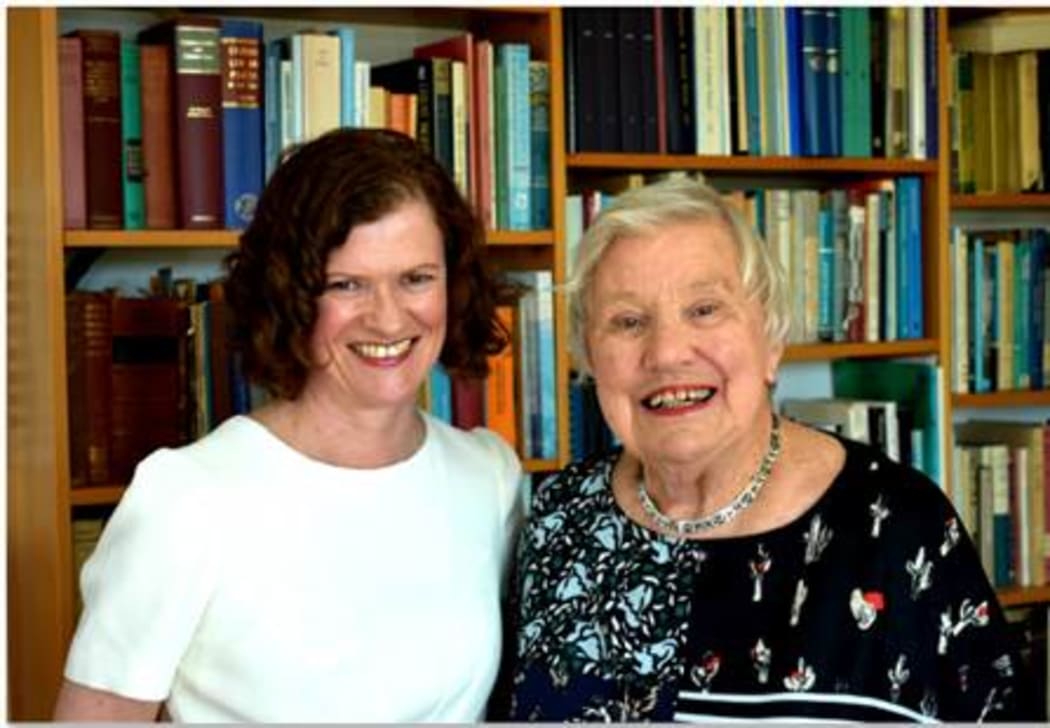A new book challenges the perception of a fair, balanced, unbiased judicial system by rewriting judgments from a Māori and feminist point of view.

Authors Janet McLean and Dame Alison Quentin-Baxter Photo: supplied
In 2003 Allistair Brooker, upset over police search warrants, took matters into his own hands to protest by approaching constable Fiona Croft at her home after she finished a night shift.
He woke her up by banging on her door for three minutes before moving to the pavement where he sang and waved placards.
After the police were called Mr Brooker was charged with intimidation.
But a District Court judge replaced that with a lesser public order offence and he was later acquitted after taking the matter to the Supreme Court.
Auckland University law professor Janet McLean said one of the judges suggested Ms Croft was a tough cop and wouldn't have been intimidated despite her reporting that she was.
"The same judge described Mr Brooker's singing to her as a serenade, when to me the message appeared to be much more chilling; I know where you live, I can find you any time, I know when you're working, I know when you're home asleep."
In a new book, Feminist Judgments of Aotearoa New Zealand, Janet McLean cast a feminist lens over the original case and in her own version of the decision argues the original charge of intimidation should have remained.
Hers is one of 25 cases spanning as far back as 1907 to as recent as the Lecretia Seales euthanasia case, in which academics and legal professionals have re-examined judges' findings from the perspective of a feminist or Māori woman judge.
One of its co-editors, Mamari Stephens from Victoria University, said it challenged the myth of judicial neutrality and showed how a different decision could be made from the exact same information.
"Inevitably there are different ways in which to view that material. There's inevitably a different way in which to interpret that material, and inevitably there's a way to bring the woman's story, or women's perspective to the forefront in a way that's actually completely reasonable."
She said it was an exercise in imagination to see how different the law could be and she hoped it prompted more inclusive judicial decisions and legal argument.
"Most our decisions that were rewritten are 21st century decisions. I think the bulk of them come from the 90s on through to 2015, so that tells you something doesn't it?"
"Ultimately feminism is very much about equality and justice, it is not about replacing one set of biases for another," contributor and family law barrister Vivienne Crawshaw said.
With the recent revelations about sexual misconduct within the legal profession Ms Stephens called it the elephant in the room with the book perfectly timed.
"Many of the judgments speak to the kind of sexual harassment and sexual discrimination that actually these young people have been experiencing and not just young people but women at all levels of the profession. Why is it we have so few female partners still when the vast majority of graduates are female? What is the reason? What is holding the advancement of women up?"
She said they sought to bring to the front what is seen, unseen or under-seen.
Court of Appeal Judge, Justice Helen Winkelmann, officially launched the book in Auckland last night at the last of four events throughout the country.
She told the gathering it was one of the most important books published in recent times and a taonga.
She said some argued attempts to change the judicial system for women would always fail as it was designed by men and had a legacy of prejudice.
"Those theorists don't understand the power of doing justice in the individual case or the momentum for change that it can create and that is the concept that lies at the heart of this book.
Justice Winkelmann said it was a reminder that appointing more women judges wasn't enough.
"All judges must be prepared to open their minds to perspectives other than their own, to receive evidence and submissions about the experiences and lives of women and to truly listen to those stories.,
However she said judges could only rely on what was put in front of them and it was also up to lawyers to do their part.
"If the arguments aren't made, if the evidence isn't led then the law won't develop.
"I can say having been a first-instance judge for 11 years before I went to the Court of Appeal and having been an avid reader in the 1980s and 1990s of feminist texts - I was hungry, I have been hungry for the arguments. I've been hungry for the evidence, but the arguments have not been made. We haven't seen cases formulated in the way they've needed to."

